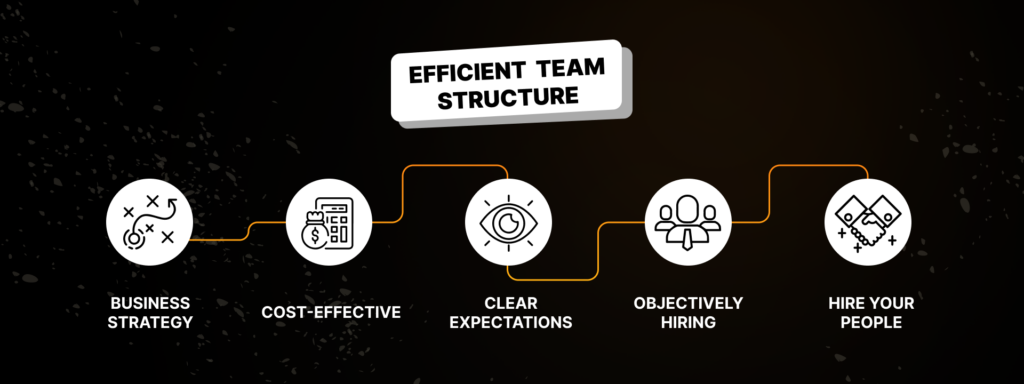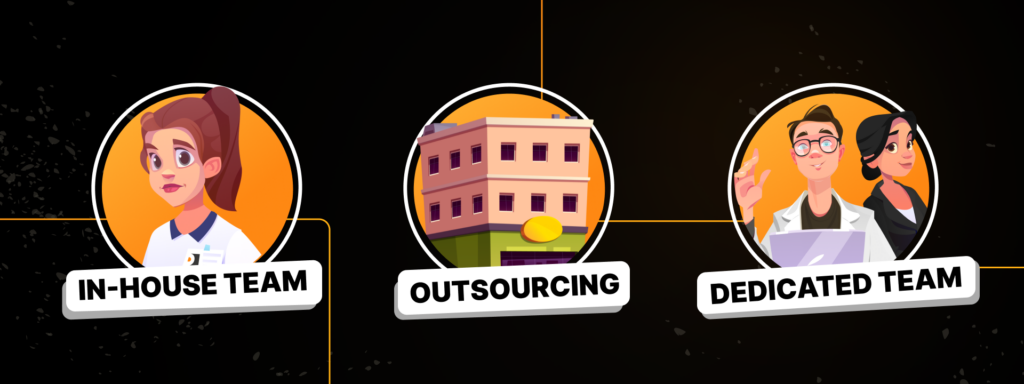How to build an eCommerce team? When starting an eCommerce business, many owners take on multiple roles within the eCommerce team structure. From managing inventory to communicating with customers, it often feels like you’re handling everything on your own.
However, as your eCommerce business grows, you’ll quickly realize that managing all tasks independently is unsustainable. That’s why hiring a dedicated eCommerce development team or bringing in experts becomes essential to scale your operations effectively.
Over the past decade, IT Delight has helped numerous startups evolve into enterprise-level companies. We’ve seen firsthand how challenging it can be to build a successful eCommerce team from scratch. To help you get started, we’ve created this guide covering every process step.
From identifying the key roles in your eCommerce team structure to developing strategies for finding top talent, we’ll walk you through everything you need to know. Whether it’s the technical side of building a website or crafting a winning marketing plan, this article will give you actionable advice for assembling the best eCommerce development team for your project.
Let’s dive in and take the first step toward building your dream eCommerce team!
Main Ecommerce Team Roles and Responsibilities
There is no one-size-fits-all rule for the eCommerce team structure; it depends on the size of your business, the types of products you sell, and your business priorities. However, understanding the key roles and responsibilities in an eCommerce team is essential for building a strong foundation. Certain roles will always be present in a successful eCommerce development team, regardless of your business model.

Ecommerce Developer
The website is the most important part of your company; it’s the head and the heart of the online business. Very few people without a professional background can code on enough level to create a website, so it’s better to delegate this work to the eCommerce developer.
Without a skilled eCommerce developer, you won’t be able to build a coherent eCommerce website architecture. When making a custom website, you’ll need more than one developer. One is to code the front-end user interface, and the other is to work on the back-end website logic. Besides, it’s necessary to have a full-stack web developer who combines both roles.
When choosing to build a website on one of the eCommerce platforms, such as Magento, you still need an eCommerce team in the long run because they will handle the security of your data, work on developing a catalog of products or services, and third-party services integrations.
You can hire in-house eCommerce developers, outsource, or find a dedicated team. We’ll discuss each of these options further in the article.
If you have any difficulties finding the right eCommerce developers, you can always contact the IT Delight team. We provide our clients with dedicated teams, individual developers, and development project managers to handle the work on their behalf.
HR Manager
Don’t be too surprised by this chapter. You do need to hire an employee to handle the recruiting process. An HR manager will track your staffing needs, employee performance, and payroll. They will provide you with regular reporting, which will allow you to make informed decisions when looking for potential candidates to fill further positions.
Besides, HRs are also responsible for onboarding new employees, saving you a lot of time. You can also utilize HR management software to optimize the employment processes.
Marketing Manager
Impeccable marketing is the backbone of your eCommerce business’s development and expansion.
A marketing manager is a person that will spread the word about your goods and services. They work with customers’ data, analyze it, and develop efficient marketing strategies to increase sales and drive traffic to your online store.
Graphic Designer
You need to ensure that your website is not simply visually appealing but also devoid of distractions. Graphic designers are responsible for such visual details as logos, button positioning, charts, data visualizations in blog posts, etc.

Content Writer
Content writers often work behind the scenes, but their contributions are essential and should not be overlooked. They provide engaging content for marketing campaigns, luring product descriptions and website content that turns users into marketing leads.
Nearly 83% of consumers stated that product content is crucial in purchasing decisions. If you have a startup, a marketing manager will work with content writers and form your marketing team structure.
Logistics Manager
This specialist is key in ensuring the safe and high-quality delivery of bulk orders from suppliers. Their responsibilities extend to managing international transportation services, handling transport insurance, and overseeing all aspects of quality control to guarantee smooth operations across the global supply chain.
By coordinating secure and efficient delivery processes, this logistics specialist minimizes risks during international shipping and ensures compliance with global standards.
For businesses requiring reliable bulk order delivery solutions, a skilled specialist can optimize processes, handle third-party logistics, and secure the highest product safety and transportation insurance standards.
Inventory Manager
These employees are responsible for inventory management, ensuring that the product quantity displayed on the website matches the actual stock levels in the warehouse. They track stock data and update it in real-time to prevent discrepancies between what’s shown online and what’s available. This role is essential for maintaining inventory accuracy and optimizing the warehouse management system.
Customer Support Specialists
Those are employees who will help your customers with all kinds of problems. They usually communicate with customers via chat, phone calls, or chatbox. They are also responsible for returns and complaints.
Finance and Accounting Specialists
Financial management is often outsourced to professionals who handle budgeting, market analysis, and financial reporting. However, larger companies may choose to hire an in-house financial team to manage things like income statements and other financial responsibilities.
Need an eCommerce development team to build your online store?
Contact our team and we will help you determine what kind of specialists do you need.
Designing an Efficient Ecommerce Team Structure
Consider your requirements and priorities to create an efficient team structure. Here are a few tips on how to approach building an eCommerce team.

Start With E-commerce Business Strategy
First, remember that the new roles in the eCommerce team structure appear with your project moving onto the next stages of business development. So, determine your business needs, goals, and values, set the appropriate budget, and define the key things you need to implement first.
With the eCommerce strategy, you’ll understand the first roles you need to fill. For example, if your main goal is to increase sales, you must invest in marketing first. Meanwhile, if you want to boost your conversion rates, it’s time to hire a dedicated development team to make the necessary changes to your websites.
Stay Cost-Effective
When we say stay cost-effective, we don’t cutting your employees’ salaries; it’s more about spending your budget wisely.
The recruitment process should be based on your business processes; in other cases, you’ll just spend money for nothing. Let’s imagine you hire a content writer but don’t have the structure of your marketing department or content marketing strategy. Your new employee won’t have any tasks to do, or even worse, will create content that doesn’t fit your business goals.
Establish Clear Expectations From Your Ecommerce Team
Before opening the hiring process, think about what your ideal employee looks like. There is also the rule of thumb: always hire people who are better than you and never compromise for less.
Determine the company’s values and culture and whether your candidates align. Only 10% of applicants will be great employees, so take your time when conducting interviews. If you choose IT Delight as your partner, check the About Us page first to learn some important details.
Make Hiring a Collaborative Effort to Assess Candidates Objectively
Create a group of people who are unbiased when making the hiring decision.
Involve the future subordinates and colleagues of the candidate in the interview process. Of course, a professional HR has to be present as well. Make sure that everyone takes notes, and you return to them from time to time, comparing them with the new employee’s success to evaluate your assessment skills.
They will help you understand the candidate’s skills and determine whether they are the right fit for your company.
Hire Your People
Make a clear distinction between in-house employees and external contractors. Yes, you can cut some costs when delegating some tasks to third-party specialists, but they won’t be as committed to your business growth as the in-house employees. They are a good option only when you need short-term help on some aspects of the business.
In-house vs. Outsourcing vs. Dedicated team
These days, no matter the industry, you get to work with professionals all over the world. You can build an eCommerce team of highly skilled professionals and cut the costs associated with work in the office. Let’s review the pros and cons of in-house, outsourcing, and dedicated teams.

In-House team: Pros, Cons, Pitfalls
In-house means that all of the employees complete tasks only for your company. They are part of the company culture and contribute to developing your business strategy.
Pros
- Higher employee retention rates. In-house employees are interested in professional growth within the company. Spend enough resources on their training and motivation, and they’ll stay loyal to your business.
- They also show more engagement and dedication. Those employees are just as committed to your eCommerce project as you are. They are also more productive because they all work together.
- There are no communication barriers or delays. You have greater control over the project implementation.
Cons
- Costs. You pay not only the salary but also taxes, insurance, sick leaves, etc.
- Burnout. It’s a common issue among in-house employees and might lead to poor productivity.
- Time-consuming hiring process. Finding a highly skilled specialist is rare luck in today’s market.
Outsourcing: Pros, Cons, Pitfalls
Outsourcing means that you delegate eCommerce tasks to third-party contractors and freelancers. For eCommerce businesses, it’s a standard practice to outsource web development to freelancers.
Pros
- Agility & flexibility. You don’t spend time on employee hiring and onboarding.
- Outsourcing agencies often have higher expertise and more experience in the field. If you face specific problems, they can provide eCommerce consulting services at quite a reasonable price.
- Lower costs. They usually charge a fixed hourly rate, and you don’t have to pay taxes, insurance, etc.
Cons
- You cannot be sure about the quality of working with a freelancer. They won’t know the details about your business, and the quality of the work might not meet their expectations.
- Less control over the tasks and project progress. Freelancers work with multiple clients, and you can’t expect them to fix your issues right away.
- Communication barriers may appear due to time differences or poor internet connection.
Dedicated team: Pros, Cons, Pitfalls
A dedicated team model involves a team working on the project remotely, which reduces the product’s time to market and boosts the client’s business processes. Important to note that such a team isn’t an extension of the customer’s team but a separate unit that has its own framework and management.
Pros
- Cost-effectiveness. Outsourcing the team from Eastern Europe won’t cost more than hiring an in-house team. Meanwhile, they’ll have the same, if not better, skills and experience. This is a great chance to reduce HR costs.
- Focused approach. All the people involved will be concentrated exclusively on your project without additional distractions.
- Transparent management. Dedicated teams work with time tracking and time management solutions that you can access upon request. This way, everyone can be on the same page regarding the project’s progress.
Cons
- Not efficient for short-term projects. Hiring dedicated teams for long-term and bigger projects that constantly evolve, have flexible requirements, and change all the time is way more effective. Otherwise, it’s better to opt for another model.
- This is not a one-size-fits-all solution. Before opting for a dedicated team, double-check whether it’s exactly what you need. Even if your project is long-term and your requirements and goals don’t match, signing a contract with a dedicated team may be unwise.
Final thoughts
Building an efficient eCommerce team for online stores can be a long and tedious task. However, you can streamline the process by partnering with an experienced eCommerce development agency.
Many businesses succeed by combining in-house eCommerce team best practices with outsourcing or by hiring a dedicated team for specific tasks. This hybrid approach allows for greater flexibility and efficiency in building an eCommerce team.
At IT Delight web development agency, we specialize in delivering scalable and results-driven eCommerce solutions. Since 2012, our team has been helping businesses grow by creating tailored, all-inclusive solutions designed to meet unique needs. Contact us today, and we’ll start crafting customized solutions for your business tomorrow.
